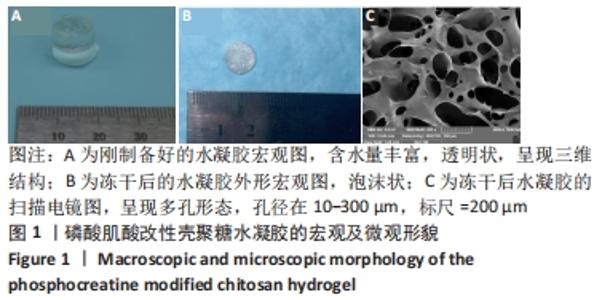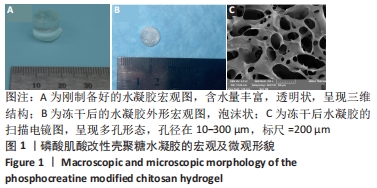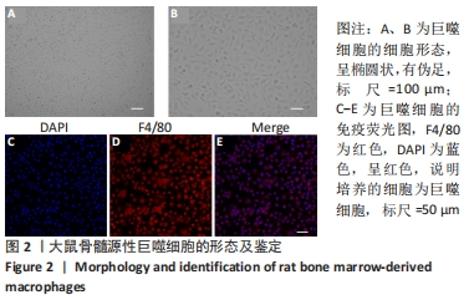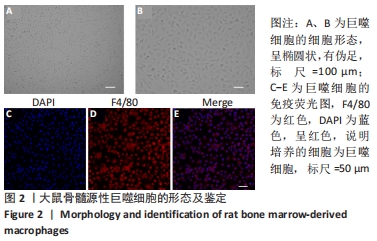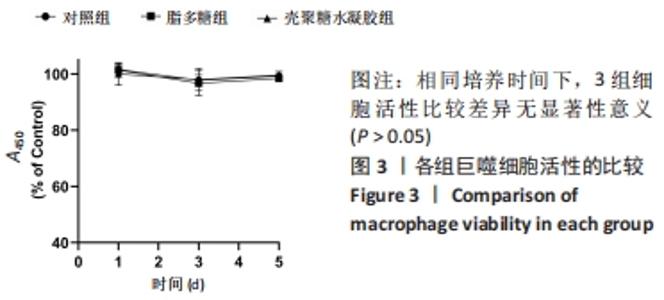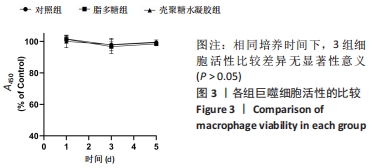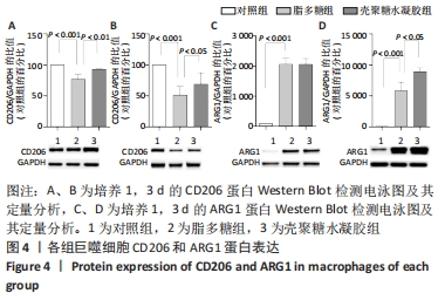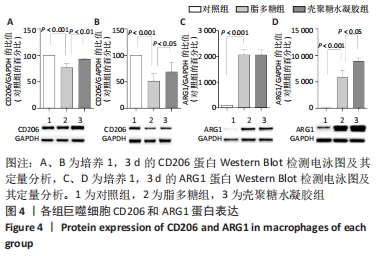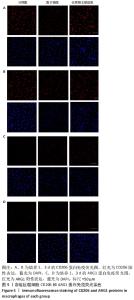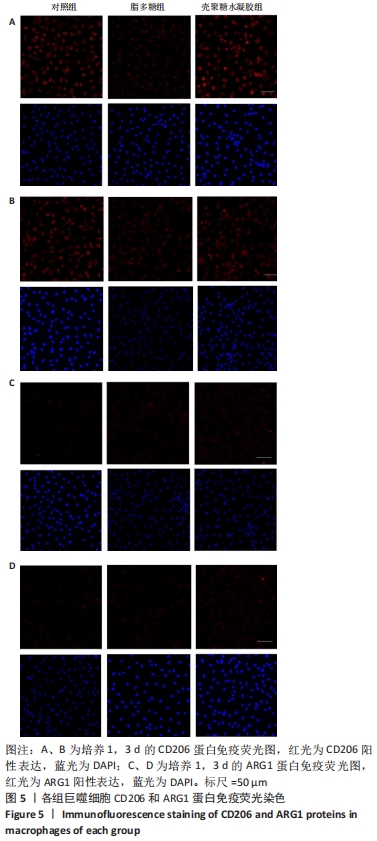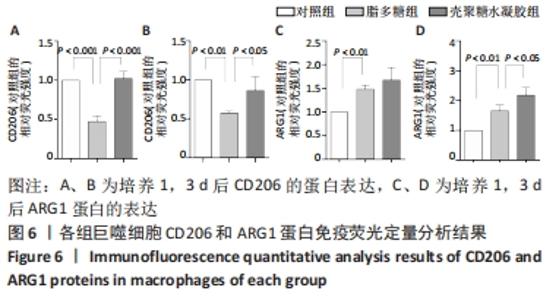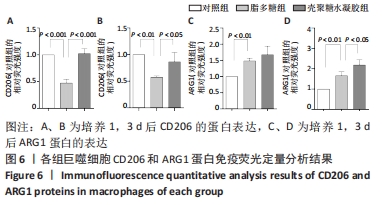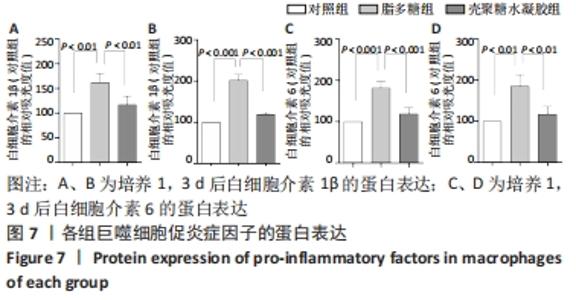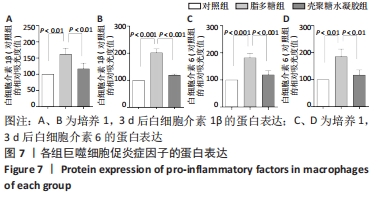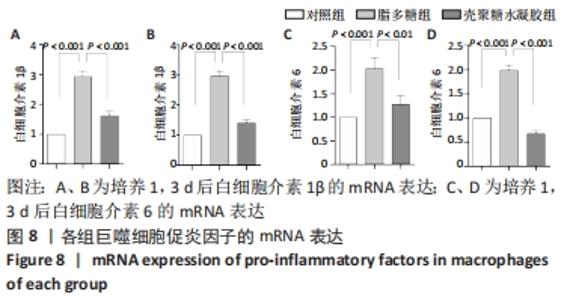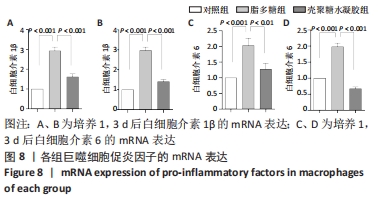Chinese Journal of Tissue Engineering Research ›› 2022, Vol. 26 ›› Issue (31): 5040-5046.doi: 10.12307/2022.959
Previous Articles Next Articles
Effect of phosphocreatine modified chitosan hydrogel on polarization and inflammatory factor expression in rat bone marrow-derived macrophages
Sheng Weibei1, 2, 3, Xiong Ao2, 3, Liu Su2, 3, Deng Jiapeng2, 3, Weng Jian2, 3, Yu Fei2, 3, Chen Yingqi2, 3, Zeng Hui2, 3
- 1Weifang Medical University, Weifang 261053, Shandong Province, China; 2Department of Bone & Joint Surgery, Shenzhen Hospital of Peking University, Shenzhen 518036, Guangdong Province, China; 3National & Local Joint Engineering Research Center for Orthopedic Biomaterials, Shenzhen 518036, Guangdong Province, China
-
Received:2021-12-03Accepted:2022-01-17Online:2022-11-08Published:2022-04-25 -
Contact:Zeng Hui, Chief physician, Professor, Department of Bone & Joint Surgery, Shenzhen Hospital of Peking University, Shenzhen 518036, Guangdong Province, China; National & Local Joint Engineering Research Center for Orthopedic Biomaterials, Shenzhen 518036, Guangdong Province, China -
About author:Sheng Weibei, Weifang Medical University, Weifang 261053, Shandong Province, China; Department of Bone & Joint Surgery, Shenzhen Hospital of Peking University, Shenzhen 518036, Guangdong Province, China; National & Local Joint Engineering Research Center for Orthopedic Biomaterials, Shenzhen 518036, Guangdong Province, China -
Supported by:National Natural Science Foundation of China, No. 82172432 (to ZH); National Natural Science Foundation of China, No. 82102568 (to YF); National Natural Science Foundation of China, No. 82001319 (to WJ); Guangdong Province Fundamental and Applied Basic Research Fund, No. 2019A1515011290 (to ZH); National and Local Joint Engineering Research Center for Orthopedic Biomaterials, No. XMHT20190204007 (to ZH); Shenzhen High-level Hospital Construction Fund, No. SZXK023 (to ZH); Shenzhen “Three Names” Medical Project, No. SZSM201612092 (to ZH); Shenzhen Research & Development Project, No. Z2021N054 (to ZH)
CLC Number:
Cite this article
Sheng Weibei, Xiong Ao, Liu Su, Deng Jiapeng, Weng Jian, Yu Fei, Chen Yingqi, Zeng Hui. Effect of phosphocreatine modified chitosan hydrogel on polarization and inflammatory factor expression in rat bone marrow-derived macrophages[J]. Chinese Journal of Tissue Engineering Research, 2022, 26(31): 5040-5046.
share this article
Add to citation manager EndNote|Reference Manager|ProCite|BibTeX|RefWorks
| [1] JIANG YZ, TUAN RS. Origin and function of cartilage stem/progenitor cells in osteoarthritis. Nat Rev Rheumatol. 2015;11(4):206-212. [2] GLYN-JONES S, PALMER AJR, AGRICOLA R, et al. Osteoarthritis. Lancet. 2015; 386(9991):376-387. [3] UTOMO L, OSCH GJVMV, BAYON Y, et al. Guiding synovial inflammation by macrophage phenotype modulation: an in vitro study towards a therapy for osteoarthritis. Osteoarthritis Cartilage. 2016;24(9):1629-1638. [4] WYNN TA, CHAWLA A, POLLARD JW, et al. Macrophage biology in development, homeostasis and disease. Nature. 2013;496(7446):445-455. [5] EPELMAN S, LAVINE KJ, RANDOLPH GJ. Origin and functions of tissue macrophages. Immunity. 2014;41(1):21-35. [6] LIU YC, ZOU XB, CHAI YF, et al. Macrophage polarization in inflammatory diseases. Int J Biol Sci. 2014;10(5):520-529. [7] HAO NB, LU MH, FAN YH, et al. Macrophages in tumor microenvironments and the progression of tumors. Clin Dev Immunol. 2012;2012:948098. [8] CHEN YL, JIANG W, YONG H, et al. Macrophages in osteoarthritis: pathophysiology and therapeutics. Am J Transl Res. 2020;12(1):261-268. [9] BOSSCHE JVD, SARABER DL. Metabolic regulation of macrophages in tissues. Cell Immunol. 2018;330:54-59. [10] GEISSMANN F, MANZ MG, JUNG S, et al. Development of monocytes, macrophages, and dendritic cells. Science. 2010;327(5966):656-661. [11] LIU CY, LI YH, YU JZ, et al. Targeting the shift from M1 to M2 macrophages in experimental autoimmune encephalomyelitis mice treated with fasudil. PLoS One. 2013;8(2):e54841. [12] SICA A, MANTOVANI A. Macrophage plasticity and polarization: in vivo veritas. J Clin Invest. 2012;122(3):787-795. [13] ATRI C, GUERFALI FZ, LAOUINI D. Role of Human Macrophage Polarization in Inflammation during Infectious Diseases. Int J Mol Sci. 2018;19(6):1801. [14] KOPECEK J. Hydrogel biomaterials: a smart future? Biomaterials. 2007; 28(34):5185-5192. [15] LI YL, RODRIGUES J, TOMAS H. Injectable and biodegradable hydrogels: gelation, biodegradation and biomedical applications. Chem Soc Rev. 2012; 41(6):2193-2221. [16] SOUZA RD, ZAHEDI P, ALLEN CJ, et al. Biocompatibility of injectable chitosan-phospholipid implant systems. Biomaterials. 2009;30(23-24):3818-3824. [17] WANG WQ, MENG QY, LI Q, et al. Chitosan Derivatives and Their Application in Biomedicine. Int J Mol Sci. 2020;21(2):487. [18] ISHIHARA M, OBARA K, NAKAMURA S, et al. Chitosan hydrogel as a drug delivery carrier to control angiogenesis. J Artif Organs. 2006;9(1):8-16. [19] BUSH JR, LIANG HX, DICKINSON M, et al. Xylan hemicellulose improves chitosan hydrogel for bone tissue regeneration. Polym Adv Technol. 2016; 27(8):1050-1055. [20] LEE S, CHOI JH, PARK A, et al. Advanced gellan gum-based glycol chitosan hydrogel for cartilage tissue engineering biomaterial. Int J Biol Macromol. 2020;158:452-460. [21] HIGHTON AJ, KOJARUNCHITT T, GIRARDIN A, et al. Chitosan hydrogel vaccine generates protective CD8 T cell memory against mouse melanoma. Immunol Cell Biol. 2015;93(7):634-640. [22] CARROLL EC, JIN L, MORI A, et al. The Vaccine Adjuvant Chitosan Promotes Cellular Immunity via DNA Sensor cGAS-STING-Dependent Induction of Type I Interferons. Immunity. 2016;44(3):597-608. [23] BUETER CL, LEE CK, WANG JP, et al. Spectrum and mechanisms of inflammasome activation by chitosan. J Immunol. 2014;192(12):5943-5951. [24] CHOI B, JO DH, ANOWER AKMM, et al. Chitosan as an Immunomodulating Adjuvant on T-Cells and Antigen-Presenting Cells in Herpes Simplex Virus Type 1 Infection. Mediators Inflamm. 2016;2016:4374375. [25] WEISCHENFELDT J, PORSE B. Bone Marrow-Derived Macrophages (BMM): Isolation and Applications. CSH Protoc. 2008;2008:pdb.prot5080. [26] RICE HM, ROSSI AP, BRADFORD MK, et al. rM-CSF efficiently replaces L929 in generating mouse and rat bone marrow-derived macrophages for in vitro functional studies of immunity to intracellular bacteria. J Immunol Methods. 2020;477:112693. [27] LAWRENCE RC, FELSON DT, HELMICK CG, et al. Estimates of the prevalence of arthritis and other rheumatic conditions in the United States. Part II. Arthritis Rheum. 2008;58(1):26-35. [28] BERENBAUM F. Osteoarthritis as an inflammatory disease (osteoarthritis is not osteoarthrosis!). Osteoarthritis Cartilage. 2013;21(1):16-21. [29] GARIEPY ER, SHIVE M, BICHARA A, et al. A thermosensitive chitosan-based hydrogel for the local delivery of paclitaxel. Eur J Pharm Biopharm. 2004; 57(1):53-63. [30] ZHANG EH, XING RG, LIU S, et al. Advances in chitosan-based nanoparticles for oncotherapy. Carbohydr Polym. 2019;222:115004. [31] KEY J, PARK K. Multicomponent, Tumor-Homing Chitosan Nanoparticles for Cancer Imaging and Therapy. Int J Mol Sci. 2017;18(3):594. [32] EL-HACK MEA, EI-SAADONY MT, SHAFI ME, et al. Antimicrobial and antioxidant properties of chitosan and its derivatives and their applications: A review. Int J Biol Macromol. 2020;164:2726-2744. [33] RASHKI S, ASGARPOUR K, TARRAHIMOFRAD H, et al. Chitosan-based nanoparticles against bacterial infections. Carbohydr Polym. 2021;251: 117108. [34] NEGM NA, HEFNI HHH, ABD-ELAAL AAA, et al. Advancement on modification of chitosan biopolymer and its potential applications. Int J Biol Macromol. 2020;152:681-702. [35] MOHANDAS A, DEEPTHI S, BISWAS R, et al. Chitosan based metallic nanocomposite scaffolds as antimicrobial wound dressings. Bioact Mater. 2017;3(3):267-277. [36] MORAN HBT, TURLEY JL, ANDERSSON M, et al. Immunomodulatory properties of chitosan polymers. Biomaterials. 2018;184:1-9. [37] JI LL, ZHAO XB, ZHANG B, et al. Slc6a8-Mediated Creatine Uptake and Accumulation Reprogram Macrophage Polarization via Regulating Cytokine Responses. Immunity. 2019;51(2):272-284.e7. [38] MA WT, GAO F, GU K, et al. The Role of Monocytes and Macrophages in Autoimmune Diseases: A Comprehensive Review. Front Immunol. 2019;10: 1140. [39] MOORE KJ, SHEEDY FJ, FISHER EA. Macrophages in atherosclerosis: a dynamic balance. Nat Rev Immunol. 2013;13(10):709-721. |
| [1] | Tang Wenjing, Wu Siyuan, Yang Chen, Tao Xi. Inflammatory responses in post-stroke depression [J]. Chinese Journal of Tissue Engineering Research, 2022, 26(8): 1278-1285. |
| [2] | Liu Jin, Li Zhen, Hao Huiqin, Wang Ze, Zhao Caihong, Lu Wenjing. Ermiao san aqueous extract regulates proliferation, migration, and inflammatory factor expression of fibroblast-like synovial cells in collagen-induced arthritis rats [J]. Chinese Journal of Tissue Engineering Research, 2022, 26(5): 688-693. |
| [3] | Liu Yiyi, Qiu Junqiang, Yi Longyan, Zhou Cailiang. Effect of resistance training on interleukin-6 and C-reactive protein in middle-age and elderly people: a Meta-analysis [J]. Chinese Journal of Tissue Engineering Research, 2022, 26(5): 804-812. |
| [4] | Zheng Meijie, Yang Weizhe, Liu Jialin, Han Xiangzhen, Zhou Qiqi, He Huiyu. Apoptosis of mouse bone marrow-derived macrophages induced by lipopolysaccharide [J]. Chinese Journal of Tissue Engineering Research, 2022, 26(31): 4962-4966. |
| [5] | Du Shasha, Cai Zhiguo, Yang Kun, Liu Qi. Pancreatic autophagy and protein expression of insulin-related genes in type 2 diabetic rats with periodontitis [J]. Chinese Journal of Tissue Engineering Research, 2022, 26(29): 4605-4610. |
| [6] | Tan Xu, Liang Yu, Liang Yan, Liao Jian. Hypoxia-treated dental pulp stem cell exosomes induce M2 macrophage polarization [J]. Chinese Journal of Tissue Engineering Research, 2022, 26(25): 3961-3967. |
| [7] | Shan Shuai, Dong Yi, Liu Jialin, Han Xiangzhen, He Huiyu. Effects of red deer horn powder extract on the biological behavior of bone marrow derived macrophages [J]. Chinese Journal of Tissue Engineering Research, 2022, 26(24): 3840-3845. |
| [8] | Xiang Mingzhi, Yuan Zilin, Wang Gang, Cheng Jie, Diao Bo, Liu Yueping. CD1d-mediated inhibition of the nucleotide-binding oligomerization domain-like receptor protein 3 inflammatory factor expression via signal regulatory protein-alpha [J]. Chinese Journal of Tissue Engineering Research, 2022, 26(24): 3826-3832. |
| [9] | Yang Ruijuan, Li Yangyang, Cai Ruiyan, Liu Huibin, Guo Chun. Interleukin-1 alpha induces osteoclast activation and bone loss [J]. Chinese Journal of Tissue Engineering Research, 2022, 26(23): 3691-3699. |
| [10] | Qi Yanan, Chen Yiyan, Zhang Ning, Wang Lin. Effect of p38 inhibitor on inflammatory factors in the patellar tendon and patella-patellar tendon junction under short-term exercise [J]. Chinese Journal of Tissue Engineering Research, 2022, 26(23): 3744-3749. |
| [11] | Liu Qiqi, Liu Min, Yang Jian, Yu Ke. Lipopolysaccharide stimulates the expression of interleukin-6 and nuclear factor kappa B receptor activator ligand in mouse MLO-Y4 osteoblasts [J]. Chinese Journal of Tissue Engineering Research, 2022, 26(20): 3121-3126. |
| [12] | Cai Zhiguo, Du Shasha, Yang Kun, Zhao Na, Liu Qi. Lipopolysaccharides mediate autophagy of mouse insulinoma βtc6 cells in high glucose state [J]. Chinese Journal of Tissue Engineering Research, 2022, 26(20): 3127-3132. |
| [13] | Yin Liang, Zhang Mingxue, Li Jianan, Jiang Feng. Inducing macrophage polarization to M2 anti-inflammatory type reduces oxidative damage in diabetic retinopathy mice [J]. Chinese Journal of Tissue Engineering Research, 2022, 26(17): 2685-2689. |
| [14] | Hu Yihua, Yang Chunhua, Lu Yuanyuan, Sun Deyi. Effect of electroacupuncture combined with triptolide on transforming growth factor beta expression in synovium and synovial fluid in a mouse model of osteoarthritis [J]. Chinese Journal of Tissue Engineering Research, 2022, 26(14): 2252-2258. |
| [15] | Hu Taotao, Chang Shusen, Wei Zairong. Macrophage polarization effectively promotes nerve regeneration after peripheral nerve injury through the M2 phenotypic regulation [J]. Chinese Journal of Tissue Engineering Research, 2022, 26(14): 2285-2290. |
| Viewed | ||||||
|
Full text |
|
|||||
|
Abstract |
|
|||||
